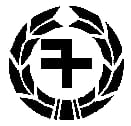New Triumph Party
New Triumph Party Partido Nuevo Triunfo | |
|---|---|
 | |
| Founder | Alejandro Biondini |
| Founded | 14 March 1990 |
| Dissolved | 17 March 2009 |
| Split from | Justicialist Party |
| Preceded by | Partido Nacionalista de los Trabajadores |
| Succeeded by | Alternativa Social (2009-2013) Bandera Vecinal (2013-2019) Patriot Front (since 2019) |
| Headquarters | Buenos Aires,Argentina |
| Ideology | Neo-Nazism Third Position Orthodox Peronism Anglophobia Anti-immigration White supremacy White nationalism Nacionalismo Irredentism Anti-Zionism |
| Political position | Far-right |
| Party flag | |
 | |
Partido Nuevo Triunfo(New Triumph Party) was a smallfar-rightandNeo-Nazipolitical party inArgentinabanned on 17 March 2009 through a ruling by theArgentine Supreme Court of Justice.[1]
Origins[edit]
The party was formed byAlejandro Biondiniin 1990 as thePartido Nacionalista de los Trabajadores(Nationalist Worker's Party), initially as a breakaway from theJusticialist Party.[2]The party leader anticipated economic crisis in the country which he felt would set up the basis for a takeover by revolutionary nationalism.[3]Biondini is a veteran of the international neo-Nazi scene, having established a group calledAlerta Nacionalin 1984, which he described as 'a small part of the great worldwide socialist movement'. This group attempted to form links between the country's various extreme right groups.[4]
Development[edit]
The party was re-launched as the New Triumph Party in November 1997, identifying itself as 'the political, militant and electoral expression of Argentine national socialism'.[5]At a time when use of theinternetby fringe political groups was limited but growing in popularity the New Triumph Party's online publicationLibertad de Opinión(Freedom of Opinion) broke new ground in Argentina by providing a regular forum for Argentine neo-Nazism andanti-Semitism.[5]Ricardo Brinzoniwas briefly associated with the group as his lawyer Juan Enrique Torres Bande was a member.[6]
The party has consistently attempted to gain legal recognition but has been rejected.[2]Nonetheless, in the2005 Argentine legislative electionBiondini's wife and son, members of the party, stood as candidates forAcción Ciudadana,a group headed by Jorge Colotto, the general commissioner of thePolicía Federal Argentina.[7]
Ideology[edit]
The party supports Neo-Nazism and seeks to use Argentina as the new Nazi base. It has been claimed that Biondini believes thatAdolf Hitlerhad identified Argentina as the future ofNazism.He has claimed that in the final days in theFührerbunkerHitler pointed to Argentina on a map and stated that 'from there the new leader will come'.[2]
The party has also been vocal in its criticism of the major political parties and leaders, denouncingFernando de la Rúaas a puppet of theZionist Occupation Government,a conspiracy theory.[2]As part of this rhetoric it also emphasises its grounding inChristianity.[8]
Platform[edit]
The ideas of the party have been summed up by them in declaration of policies which states five aims for the Argentine people. These are listed as:
- The reaffirmation of the values of Argentina, based on God and country with a firm stance taken against all who would seek to damage these values.
- Dignity for the Argentine worker, through the establishment of acorporatistparliament.
- Defence of nationalsovereigntyat all costs, with a systematic programme of rearmament in order to recover theMalvinas Islands(Falkland Islands) andPatagonia.
- The establishment of a purely Argentine economic system which would eliminateusuryand unite classes under corporatism.
- A much stricter legal code, including punishments for those it feels have benefitted from Argentina's struggles.[9]
References[edit]
- ^La Corte Suprema le negó la personería jurídica a un partido nazi. Clarín, 17 March 2009Archived20 March 2009 at theWayback Machine·
- ^abcd'Kalki y las camisas negras'
- ^D. Gatti,'Cybernetic Neo-Nazis'
- ^"'Neo' Nazismo en América Latina "[ "Neo" Nazism in Latin America].Tribuna Israelita(in Spanish). 2016.Retrieved8 August2021.
- ^ab"Argentina".Institute for Jewish Policy Research and American Jewish Committee.1999. Archived from the original on 2007-11-12.
{{cite web}}:CS1 maint: unfit URL (link) - ^'Nuevo Triunfo de Brinzoni'
- ^Carnota, Fernando (1995), El Palacio de la Corrupción, Buenos Aires: Editorial Sudamericana.ISBN950-07-1047-1
- ^Programme of GovernmentArchived2007-12-01 at theWayback Machine
- ^"Proclama al Pueblo Argentino"[Proclamation to the Argentine People].Partido Nuevo Triunfo(in Spanish). 5 December 1997. Archived from the original on 2002-08-04.
{{cite web}}:CS1 maint: unfit URL (link)
External links[edit]
- 2009 disestablishments in Argentina
- Antisemitism in Argentina
- Fascism in Argentina
- Christian political parties
- Neo-Nazism in Argentina
- Neo-Nazi political parties
- Political parties established in 1990
- 1990 establishments in Argentina
- Defunct political parties in Argentina
- Banned far-right parties
- Political parties disestablished in 2009
- Peronist parties and alliances in Argentina
- Third Position
- Far-right political parties
